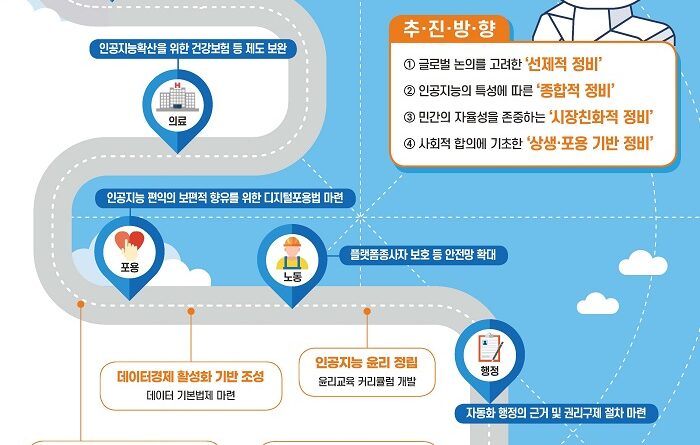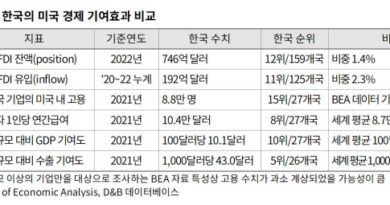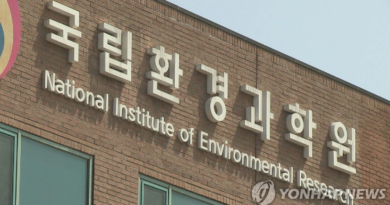Preparation of ‘road map for legislation, institution, and regulation maintenance’ to prepare for the age of artificial intelligence
Present 30 tasks in 11 areas to promote artificial intelligence utilization and achieve minimal side effects
In the era of artificial intelligence, the government has prepared a “road map for law, institution, and regulatory maintenance” such as the right to explain decisions that rely on automated personal information processing and the introduction of objections.
The Ministry of Science and ICT and the Office for Government Policy Coordination said at a meeting on the 24th that they will finalize and announce the “road map for the overhaul of artificial intelligence laws, systems and regulations” and lay the legal groundwork for preparing for the era of artificial intelligence.

AI legal system maintenance road map infographic.
In order to establish a road map, the Ministry of Science and Technology operated a legislative maintenance team consisting of humanities, society, and science philosophy personnel, and produced 30 maintenance tasks in 11 areas through discussion results, additional expert opinions, and consultations with related ministries.
In addition, in establishing this ‘road map for the improvement of artificial intelligence laws, systems, and regulations’, comprehensive and preemptive maintenance was carried out to overcome the gap between new technologies and relief systems due to the unique technological characteristics of artificial intelligence and fast development speed. Reflecting the results of the analysis of the domestic legal system and overseas legislative trends, the government will come up with legislative readjustment plans to meet global trends, and draw up a road map to prioritize private autonomy based on social consensus, and present milestones in law, institutions, and regulations on artificial intelligence.
Common Foundation for Artificial Intelligence
Data is the basis of artificial intelligence and a key resource for national and social innovation, and there is a need for additional legislation to promote (production, trading, and utilization) the data industry to revitalize the data economy after the revision of the Data 3 Act.
In response, the government will enact a “Basic Data Act” in the first half of next year that clarifies the concept and participants of data and defines government responsibilities, and also push ahead with legislation (Industrial Digital Transformation Promotion Act and Small and Medium Business Smart Manufacturing Innovation Act) in the first half of next year.
In addition, the Personal Information Protection Act will be revised in the first half of next year to introduce the right to explain and raise objections to decisions relying on automated personal information processing, and the Copyright Act will be revised to enable large amounts of data analysis and artificial intelligence learning.
It also secures transparency and fairness in algorithms. Since algorithms have a significant influence on decision-making across politics, society, economy, and culture, such as credit evaluation, product recommendation, price determination, and artificial intelligence interviews, it is necessary to secure the transparency and fairness of algorithms to lay the foundation for trust in using artificial intelligence technology.
In response, the government plans to first induce a system that evaluates and manages algorithm bias and errors on its own so that companies’ development of algorithms does not shrink.
It will also discuss the corporate nature of artificial intelligence. In case artificial intelligence performs some of human intellectual capabilities or can make autonomous judgments, expert opinion surveys show that AI’s corporate identity and responsibility are the most important legal issues in the age of artificial intelligence.
In response, the government will push for a long-term task to discuss whether to recognize intellectual property rights of investors and developers of artificial intelligence creations and to revise civil and criminal laws.
Establishing a responsible system for artificial intelligence is also important. Civil and criminal responsibility issues for damages, injuries, and crimes by autonomous judgment of artificial intelligence directly related to the corporate nature of artificial intelligence may also emerge.
The government plans to review whether artificial intelligence can be considered an act by an agent if it signs a contract, and whether to revise the civil law and create an administrative disposition to enable rights relief for damages and crimes caused by artificial intelligence.
In addition, the government plans to strengthen school ethics education along with research and development of ethics education curriculum as international organizations and international organizations are announcing principles to realize ethical artificial intelligence.
Utilization and diffusion of artificial intelligence
First of all, while the use of artificial intelligence is increasing in the medical sector for new drug development and medical data analysis, it seeks to spread artificial intelligence in the medical sector through supplementation of the system.
The government will take the lead in preparing international standards for artificial intelligence medical devices in the first half of 2022 by taking advantage of Korea’s experience in establishing the world’s first guidelines for medical device licensing applied with big data and artificial intelligence technology.
The financial sector is one of the areas where artificial intelligence is most actively used, such as financial product development, customer management, investment consultation, credit evaluation, and customer counseling chatbot, and needs to be harmonized between using artificial intelligence and securing safety in financial accidents and investment losses.
In response, the government will operate an “electronic signature evaluation and recognition system” that can determine the reliability of private certificates, and strengthen financial-related safety in the second half of next year by preparing guidelines for sharing abnormal financial transactions among financial institutions.
In the administrative area where artificial intelligence can be introduced, it is necessary to establish a clear legal basis and ensure transparency and prevention of administrative errors.
The government plans to enact a basic administrative law to lay the legal ground for automated administrative actions using artificial intelligence and prepare procedures for rights relief against errors in the second half of next year.
Various prospects are emerging such as job losses due to the introduction of artificial intelligence, the emergence of new jobs, and job changes and movements. As a result, it is necessary to protect new types of jobs and expand social safety nets such as employment insurance to cope with changes in the labor market.
The government plans to continue to push for related measures for platform workers by revising laws to apply employment insurance to platform workers and studying ways to improve industrial safety and health.
As there are also calls for laying the legal foundation for digital engagement policies, such as strengthening citizens’ capacity and narrowing the gap, the government plans to enact a digital inclusion law and devise measures to deal with accidents caused by artificial intelligence in the long run.
In addition, regulatory innovation roadmaps and preemptive regulatory innovation will be carried out in autonomous driving areas with high economic ripple effects such as autonomous vehicles and autonomous navigation ships. In the field of self-driving cars, individual tasks will be carried out step by step in accordance with the established road map, while autonomous navigation vessels will establish a regulatory innovation roadmap within next year.
For the 30 tasks discovered in the road map, the government plans to establish plans to prepare maintenance targets and maintenance measures for each task, including drawing up specific legislation and revision plans.
Next year, the 2nd Artificial Intelligence Legislation and Maintenance Team” will be formed to continuously find new tasks and to actively reach social consensus through cooperation with the 4th Industrial Revolution Committee and related ministries in the specific legislation process due to the nature of the tasks.”
Inquiries: AI-based Policy of the Ministry of Science and ICT(044-202-6275), Regulatory Innovation Planning Office(044-200-2912)
[Source] Korea Policy Briefing (www.korea.kr)








